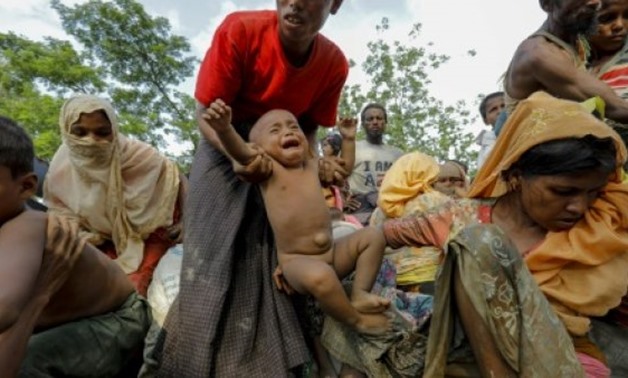
Rohingya refugees arrive at a makeshift new camp in Unchiprang in Bangladesh - AFP
TEKNAF (BANGLADESH) - 7 September 2017: Once-lush hillsides have been stripped bare and transformed into squalid tent cities as Rohingya refugees pour into Bangladesh, joining thousands enduring hunger and disease after fleeing violence in Myanmar.
After dangerous boat crossings or gruelling journeys on foot with little food or water, they do what little they can to shield their families from monsoon rains, frantically building shelters from bamboo and scraps of tarpaulin.
In the last two weeks 164,000 mostly Rohingya civilians have fled an eruption of fighting in Myanmar, overwhelming refugee camps in Bangladesh that were bursting at the seams even before the latest influx.
Once they arrive, they face fresh threats to survival.
"All my children have cold and fever. These plastic sheets cannot protect us from the monsoon," Fatimatuz Zuhra told AFP on the blighted hillsides of Unchiprang, some 20 kilometres (12 miles) from the border.
"I have no idea what I will do if I have to live here longer. I think about the winter and I am terrified," she said as she squatted in the mud near her makeshift dwelling, one of some 15,000 people taking refuge there.
New settlements are mushrooming across Bangladesh -- in fields, hillsides and along roads and rivers -- after the exodus that followed a massive Myanmar security sweep following deadly ambushes by Rohingya militants.
But the impoverished country -- which already housed 400,000 Rohingya before the latest influx -- is ill-equipped to deal with a situation that aid agencies warn is rapidly becoming a humanitarian catastrophe.
At least 33,000 Rohingya who have crossed since August 25 are living in "spontaneous settlements" like Unchiprang which are quickly expanding, the United Nations said in a report this week.
It said many from the stateless Muslim minority, who Myanmar regards as illegal immigrants, were "staying in the open air, suffering from exhaustion, sickness and hunger" after walking for days.
- 'Feel so helpless' -
Even established camps like Kutupalong, one of the largest Rohingya bases in Bangladesh, bear the visible scars of the latest surge in new arrivals.
The original campsite has been dwarfed by an explosion of frantic construction as refugees take up every available space around the rice and rubber plantations that surround it.
Just one tree remained on a razed mountainside outside the main camp, where refugees had felled trees for homes and firewood.
Many refugees complained that the price of bamboo and other basics needed to build shelters has soared.
"People are coming, and it's good for me and good for them," said 16-year-old Bangladeshi Abdul Khalek, standing protectively over a pile of bamboo he had chopped down to sell.
Those unable to afford even the basics squat where they can, taking shelter beneath trees and washing in rivers.
Whole families crouch by the muddy roadside begging for food, causing a desperate rush when biscuits and other goods are thrown from moving vans into open hands.
Children splash about in filthy water, while young men carry the elderly and disabled over muddy road passes on bamboo slings over their shoulders.
At the camp's overwhelmed clinic, an old man wrapped in bandages struggled to sit upright to drink from a pitcher.
Others brought malnourished children or nursed wounds that hinted at the violence they had fled.
"They are burning homes, burning people and shooting them. That's why I escaped with my two children," said Hamida Begum, referring to Myanmar's security forces, who have been accused of atrocities against the Rohingya.
"They burned my home and hacked my husband to death," she told AFP.
New arrivals keep coming, with long columns of people snaking down the road towards the border, putting ever-increasing strain on the meagre resources available.
Bangladeshi border guards who were rounding up and deporting Rohingya recently were now letting them stream by unchecked, said community leader Shah Alam.
Zuhra in Unchiprang has not seen her husband since they made the perilous journey across the Naf River, and knows nothing of his fate.
She cannot return to look for him. Violence stalks the hills of Rakhine, where refugees report whole villages lying ghostly empty and landmines dotting the hills in what they say is an effort to deter returnees.
Many men have stayed behind to fight with the Rohingya militants battling the Myanmar army, some by choice and others reportedly by forced conscription.
Zuhra, a 25-year-old mother of four, is unsure whether to wait for her husband, knowing it means languishing in the muddy hills to beg.
"I feel so helpless," she said, "but I cannot see my children suffer."

Comments
Leave a Comment